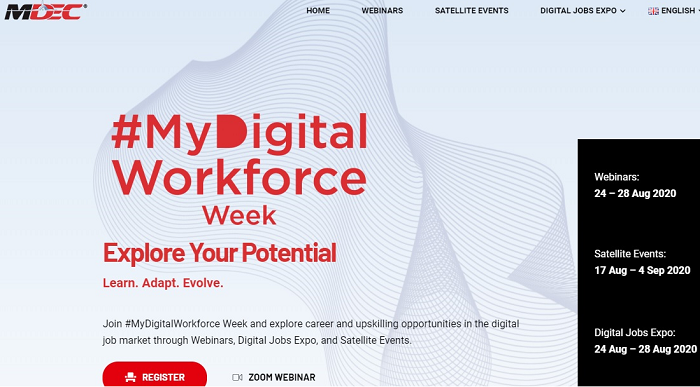#MyDigitalWorkforce Week: Digital is where the jobs are, but communication, self-improvement will prove important to land them
By Tan Jee Yee August 25, 2020
- Due to accelerated digital transformation, digital jobs in high and growing demand
- Micro-learning, communication skills and career skills are important to succeed

In a post Covid-19 world, a vital question surfaces: will there be jobs, and where will they be? While Malaysia may be on the road to recovery following the movement control order (MCO), there is undoubtedly still concern about the prospect of work in uncertain socio-economic times.
The short answer is that work opportunities are still aplenty. One only has to look towards digital jobs [download pdf above for an infographic of the key tech roles available], though simply knowing where to find them is half the battle. Being equipped with the right skills and mindset will be equally important in finding work in these trying times.
This is one of the conclusions during the first keynote panel of the exciting #MyDigitalWorkforce Week, a week-long event by the Malaysia Digital Economy Corporation (MDEC) that seeks to offer career and upskilling opportunities in the digital job market. This is done through a digital jobs expo, various satellite events, and online webinars hosted by industry leaders.
 The kick-off panel for the #MyDigitalWorkforce got straight into the heart of the matter with the topic, “Post Covid 19: Where are the jobs?”, which was participated by Pikom Academy chair Anthony Raja Devadoss, Brandt International chief executive officer (CEO) Munirah Looi, Les Copaque CEO Haji Burhanuddin Md. Razi, MDEC CEO Surina Shukri and NACSA’s Cybersecurity Technology Division director Harme Mohamed.
The kick-off panel for the #MyDigitalWorkforce got straight into the heart of the matter with the topic, “Post Covid 19: Where are the jobs?”, which was participated by Pikom Academy chair Anthony Raja Devadoss, Brandt International chief executive officer (CEO) Munirah Looi, Les Copaque CEO Haji Burhanuddin Md. Razi, MDEC CEO Surina Shukri and NACSA’s Cybersecurity Technology Division director Harme Mohamed.
Kicking things off, Munirah (pic, left) states that while Covid-19 has massively disrupted a lot of industries, there are also industries that were positively impacted during the pandemic as well. Observably, these are industries that are primarily in the e-commerce space, online retail and logistics.
Additionally, the MCO period saw a lot of companies quickly pivot their businesses to ride on the digital stage in order to remain relevant. “They have recognised digital transformation, which was once a smart strategy, as now a survival strategy,” she says.
With that, Munirah observes that jobs on the rise now are primarily in the area of customer management and services, digitalisation, digital marketing, content review and IT development. Munirah also sees new waves in big data, data intelligence and analytics – areas that require the ability to mine, predict and personalise services to customers in order to stay relevant.
Even within Brandt, Munirah says that during the MCO period, they managed to place about 200 people fulfilling such requirements in the digital space. They now have an additional 100 jobs available as well.
Digital jobs is where it’s at
In short, digital jobs are only going to grow in a post Covid-19 world. NACSA’s Harme echoes Munirah by adding that the current limitations following the pandemic meant that jobs will entail services that can be delivered from remote locations without requiring the worker to be on site.
As such, cybersecurity jobs fit nicely in such environments. Harme notes that cybersecurity jobs like penetration testing and being a bug bounty hunter for global clients are jobs that can be done from the comfort of one’s home.
Additionally, with the expansion of e-commerce due to the pandemic, cybersecurity professionals are needed even more in order to keep facilities and infrastructure secure. “As one digital industry grows, cybersecurity demand will also follow,” he says.
PIKOM Academy’s Anthony further adds that ICT companies are accelerating faster following the pandemic. For instance, 30 days following a survey conducted by Pikom on employment needs, 100 ICT companies responded that they are seeking to collectively hire around 1,000 more employees. The survey was done in response to Penjana (Malaysia’s short-term economic recovery plan) with Pikom collaborating with the Human Resources Development Fund (HRDF).
The prime areas that are hiring here are BPO and global business services, as well as business process automations. This is followed by e-commerce, cybersecurity, AI and big data, digital content (including digital UI and user experience), and IoT.
Burhanuddin, whose company Les Copaque is the creator of the smash success Upin & Ipin franchise, expressed concern for the digital creative industry. The pandemic notwithstanding, the enforcement of COPPA (Children's Online Privacy Protection Act) meant that advertisements are not allowed on children’s content on platforms like YouTube, dealing a blow to the income of animation studios.
On top of that, TV stations in Malaysia are facing financial constraints following the pandemic, and as such would avoid buying the more expensive local animation to favour cheaper syndicated content. Even with government grants and Penjana in place, Burhanuddin is worried about where these production houses can sell their finished projects to generate income. In turn, jobs will undoubtedly be affected.
The good news is that animation studios like Les Copaque are still stable. They have even recruited those who have been retrenched during the MCO period.
.png) And this may come as a surprise to many but jobs are still plentiful. MDEC’s Surina (pic, left) points towards MYFutureJobs, a dedicated job portal by the government. Launched in mid-June, the portal has already seen 212,000 jobs listed, with 10% of them being digital jobs. And, the jobs are increasing.
And this may come as a surprise to many but jobs are still plentiful. MDEC’s Surina (pic, left) points towards MYFutureJobs, a dedicated job portal by the government. Launched in mid-June, the portal has already seen 212,000 jobs listed, with 10% of them being digital jobs. And, the jobs are increasing.
The skills needed
To be sure, while jobs are certainly available, what are the skills required by these industries? Munirah points out that the critical skills needed for the digital space is a combination of both digital technical skills as well as social media skills.
“What this means is that it all boils back down to communication,” she says. “Communication, from my perspective, is the ability to create and transact with your customers and consumers on a day to day basis. That becomes a fundamental skill, because with digital we’re not talking about the domestic market, but a global one.”
She further notes that English is a fundamental language to reach an international market, but they have also observed a growing consumer base of Mandarin speakers, which makes Chinese an equally important skill.
On the cybersecurity front, Harme says that an IT background will be a plus. Technical skills, however, are not entirely necessary – the cybersecurity industry, he says, require people with skills in project management, data analytics, data science, technical writing and even law. “It’s about making the technical to matter to humans. That’s where I think the jobs are.”
Burhanuddin, however, stresses on the importance of being able to sell oneself during interviews. He places less emphasis and importance on grades and training, and instead looks for “attitude”. “Are they willing to understand our company, our product? For these people, it’s easy for us to train. But if they don’t even understand our company, how can we accept them?”
For a company that runs on storytelling, Burhanuddin is seeking storytellers – and it begins with people being able to tell a story about themselves well.
Anthony concurs, adding that jobseekers need to work on their career skills – that is, to be interested in their jobs, and be passionately prepared before going for an interview. They also need to be flexible, able to grab opportunities and learn continuously.
Building on that, Munirah says that from Brandt’s experience, it takes a ratio of about 80 interviews to hire one person, with the reason for the high levels of rejection primarily revolving around “communication”.
“In the context of the interview, you need to market yourself, tell a story about yourself. If you cannot do that, you can be axed almost immediately,” she warns, adding that organisations don’t necessarily only focus on technical skills, but other areas such as customer centricity, creative thinking, and the right mindset.
Micro-learning: A solution? 
During the panel session, moderator Karamjit Singh from Digital News Asia raised a question on the importance of micro-learning, which entails jobseekers to seek out small learning units and short-term learning activities online.
Munirah says that this is a plus for jobseekers, especially for those looking to secure jobs in a shorter period of time. “Micro-credential and bite-sized learning that give you that leverage, but it goes back to how passionate you are, and what skills you want to develop. It will allow you to personalise your own learning and build capability to be more marketable in the workforce.”
Anthony (pic, right) says that micro-learning can aid in building career management skills, which he describes as “a full suite of skills that include preparation, marketing oneself, refining resume and your interviewing skills, and repackaging yourself into the new industry.”
Micro-credentials are also short, fast, flexibile and affordable, which can help jobseekers get equipped for the area they are transitioning to after Covid-19, especially in attempting new opportunities. He points to the #MyDigitalWorkforce Week as a platform with these opportunities consolidated in one place for the digital technology ecosystem.
At the same time, Pikom – with Penjana and HRDF – are offering programs for employers to train new hires.
Anthony adds that micro-credentials are stackable, where even a graduate from a different industry can build basics and then stack them with other credentials through micro-learning.
Surina notes that completing such courses can show potential employers that the jobseeker is hungry for growth and opportunities. However, these may all be in vain if one doesn’t improve on marketing themselves well during the process. As Munirah and Anthony stress, it begins from the creation of one’s resume.
“You don’t want to be screened out without being given an opportunity to even come for the interview,” Munirah says.
Chipping in, Surina cites the many resumes she has seen herself where job seekers cite their sales responsibilities but without sharing what percentage of sales rose in those projects. This makes it difficult for a recruiter to gauge the candidate’s abilities.
Ultimately, Munirah believes that credentials are merely stepping stones – what’s important is to “create your own ladder” through continuous learning and being open to explore opportunities. “The end game is about getting that experience,” she says.
Harme believes that it’s a good time for people to pick up new languages – specifically programming language. “That’s another skill that you can take up during this time,” he says, adding that there are even courses on coding offered for free.
Surina reiterates the need for candidates to research the companies before applying for a job, especially in the lens of understanding the problems the organisation has that the candidate can help solve. She also notes the importance of networking, as well as finding support groups during the job-seeking processes.
“Lastly, don’t lose hope. Sometimes it’s just a matter of timing, of fit. Sometimes it’s also just a matter of luck,” she says.
In concluding, Anthony says that jobseekers have to “power your career”, in that they need to market themselves well and equip themselves better. “Anyone who needs to make a shift in career, this is your time to take the bull by the horn. Digital tech careers are available. This platform today [#MyDigitalWorkforce], has something practical and valuable for people to participate in the various activities during the week, pick up tips and apply them.”
[Ed: #MyDigitalWorkforce Week webinars and job expo is happening till Aug 28, with interesting satellite events (including free & discounted digital skills training) until Sep 4. Register at www.mydigitalworkforceweek.my]
Karamjit Singh contributed to the article.
Related Stories :


